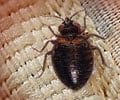Climate change has resulted in the emergence of infectious diseases in new places and new hosts, such as West Nile virus and Ebola, report zoologist.

Referring to the 1971 science fiction film about a deadly pathogen, Brooks said, "It's not that there's going to be one 'Andromeda Strain' that will wipe everybody out on the planet. There are going to be a lot of localized outbreaks putting pressure on medical and veterinary health systems. It will be the death of a thousand cuts."
Brooks and his co-author, Eric Hoberg, a zoologist with the U.S. National Parasite Collection of the USDA's Agricultural Research Service, have personally observed how climate change has affected very different ecosystems. During his career, Brooks has focused primarily on parasites in the tropics, while Hoberg has worked primarily in Arctic regions.
Each has observed the arrival of species that hadn't previously lived in that area and the departure of others, Brooks said. "Over the last 30 years, the places we've been working have been heavily impacted by climate change," Brooks said in an interview last week. "Even though I was in the tropics and he was in the Arctic, we could see something was happening."
Changes in habitat mean animals are exposed to new parasites and pathogens. For example, Brooks said, after humans hunted capuchin and spider monkeys out of existence in some regions of Costa Rica, their parasites immediately switched to howler monkeys, where they persist today. Some lungworms in recent years have moved northward and shifted hosts from caribou to musk oxen in the Canadian Arctic.
But for more than 100 years, scientists have assumed parasites don't quickly jump from one species to another because of the way parasites and hosts co-evolve. Brooks calls it the "parasite paradox." Over time, hosts and pathogens become more tightly adapted to one another. According to previous theories, this should make emerging diseases rare, because they have to wait for the right random mutation to occur.
"Even though a parasite might have a very specialized relationship with one particular host in one particular place, there are other hosts that may be as susceptible," Brooks said. In fact, the new hosts are more susceptible to infection and get sicker from it, Brooks said, because they haven't yet developed resistance. Though resistance can evolve fairly rapidly, this only changes the emergent pathogen from an acute to a chronic disease problem, Brooks adds. "West Nile Virus is a good example - no longer an acute problem for humans or wildlife in North America, it nonetheless is here to stay," he said.
Knowing the geographic distribution and the behavior of the non-human reservoirs of the pathogen could lead to public health strategies based on reducing risk of infection by minimizing human contact with infected animals, much like those that reduced the incidence of malaria and yellow fever by reducing human contact with mosquitoes.
Museum scientists versed in understanding the evolutionary relationships among species could use this knowledge to anticipate the risk of the pathogen becoming established outside of its native range.
Source-Medindia
 MEDINDIA
MEDINDIA



 Email
Email




